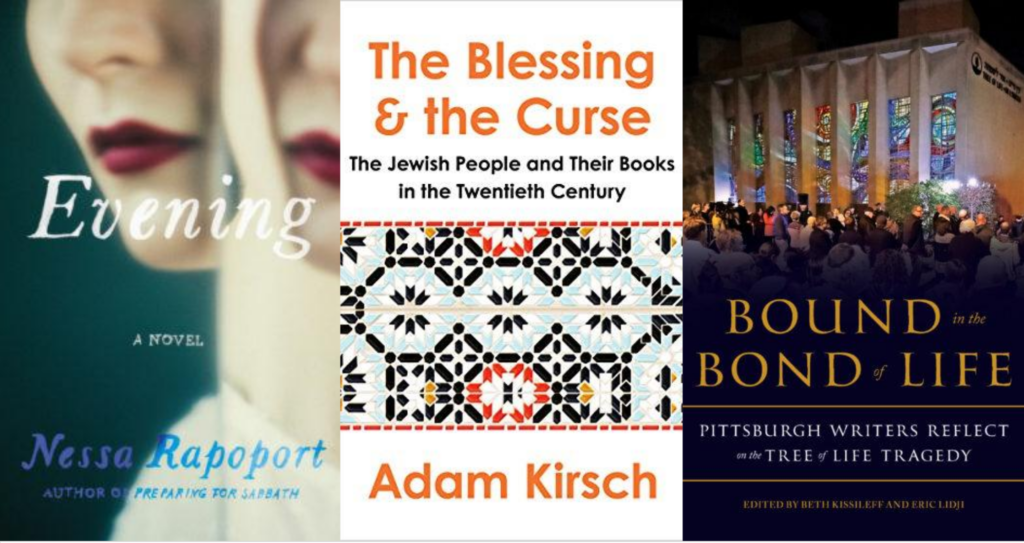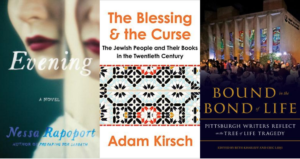Forthcoming Jewish Books

This post presents 10 forthcoming Jewish books on my readerly radar. All of them are slated for publication over the next three months.
Fiction
Evening: A Novel by Nessa Rapoport (Counterpoint, September). I pre-ordered this novel by my friend Nessa months ago, and I can’t wait to read it. Organized around the Jewish mourning ritual known as shiva, the novel focuses on a pair of sisters and their rivalry. In a starred review, Publishers Weekly calls Evening a “smart, darkly funny novel” that is “suffused with deep feeling.” (My kind of book!) Sign up for the launch event on Tuesday, September 1: Shakespeare & Co. is hosting, and Nessa will be in conversation with Daphne Merkin.
The Memory Monster by Yishai Sarid (trans. Yardenne Greenspan; Restless Books, September). This book is the only one listed here that I’ve actually had the chance to read (via a complimentary advance reading copy that came my way). And I recommend it. I don’t read Hebrew, so I can’t offer any special insights into the translation. But I can tell you that the prose here reads beautifully. And the first-person narration is seamless and immersive. Our narrator is a young Israeli historian, and the book unfolds as his report to a superior at Yad Vashem (Israel’s Holocaust memorial center) about a work-related incident. And that’s all I’ll say for now.
The Lost Shtetl: A Novel by Max Gross (HarperCollins, October). The “lost” shtetl of this novel has miraculously been spared the Holocaust (and lots of history since). Then comes a confrontation with the 21st-century. The premise isn’t one that would normally appeal to my realist proclivities. But pre-publication buzz, including this essay by Andrew Silow-Carroll, has swayed me. I hope to get to this one soon.
To Be a Man: Stories by Nicole Krauss (HarperCollins, November). This is Krauss’s first short-story collection. Need I say more?
Nonfiction
A Place of Exodus: Home, Memory, and Texas by David Biespiel (Kelson Books, September). As I draft this post I realize that it lists no poetry books—and that’s not ideal. But at least there’s a poet’s memoir! Among other tidbits, Biespiel’s bio on his publisher’s website notes that he is “the author of six collections of poetry, three books of nonfiction, and is the editor of two anthologies….He is Poet-in-Residence at Oregon State University, a core faculty member in the Rainier Writers Workshop MFA Program, and founder of the Attic Institute of Arts and Letters.”
The Blessing and the Curse: The Jewish People and Their Books in the Twentieth Century by Adam Kirsch (Norton, October). Kirsch’s 2016 The People and the Books (which I loved) offered a curated overview of key Jewish books up to the beginning of the 20th century. The Blessing and the Curse picks up chronologically where that book left off (although it’s apparently structured differently). I cannot wait to read it.
Golem Girl: A Memoir by Riva Lehrer (One World, October). This is the one that has come to my attention most recently. The book evidently chronicles the author’s experience of disability; the title’s invocation of “golem” is thus especially provocative.
The Rise and Fall of Jewish American Literature: Ethnic Studies and the Challenge of Identity by Benjamin Schreier (University of Pennsylvania Press, October). I’ll admit that this one makes me a tad apprehensive. (For starters, the marketing copy alone makes me worry about the academic-speak that may lurk within.) But I can’t resist the overall topic, and I’m hoping for some insightful reviews to help guide me along.
Anthologies
The New Spice Box: Contemporary Jewish Writing edited by Ruth Panofsky (New Jewish Press, October). I was clued in to this anthology by my friend Jessamyn Hope, whose work you’ll find within. New Jewish Press is an imprint of the University of Toronto Press, and the prose and poetry works contained here come from writers with clear Canadian connections.
Bound in the Bond of Life: Pittsburgh Writers Reflect on the Tree of Life Tragedy edited by Beth Kissileff and Eric Lidji (University of Pittsburgh Press, October). Slated for an on-sale date of October 27—coinciding with the second anniversary of the murderous attack—this anthology surely won’t be an easy read. But, knowing a few of the contributors, I suspect strongly that it will be an important and worthwhile one. Note that a portion of the proceeds from sales will support Jewish Family and Community Services of Pittsburgh.

I have put three of these on my list. Thanks for the alert, Erika.
Erika,
Thanks! There are quite a few here I’d like to add to my list.
Erika, thanks for the heads up. Different choices for potentially different audiences. Will add a number to my list.
Comments like these make all of the work that goes into a post like this one worthwhile. Thank you all so much!
Erika, Wonderful post. I’m doing a cut and paste so I have the list handy.
I’m so glad!
I read The Memory Monster in Hebrew, and every time life’s banal practicalities interrupted my reading I could not wait to get back to it (I also enjoyed Sarid’s previous novel The Third [HaShlishi], which is not yet available in English). But I wonder how representative of actual Israeli opinion are the disturbing remarks of the fictional Israeli high school students and soldiers whom the narrator guides through the death camps.
I read and enjoyed The Memory Monster in Hebrew (I also enjoyed his previous novel HaShlishi), but I wonder how representative of actual young Israeli opinion are the disturbing remarks of the fictional high school students and soldiers the narrator guides through the death camps in Poland.
Good question, David.
Thanks for the heads up, Erika. And my wife will especially appreciate the fiction titles.
I’m so glad!